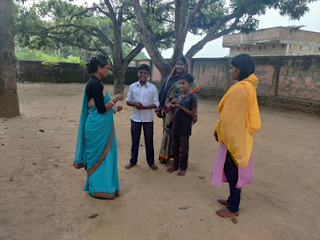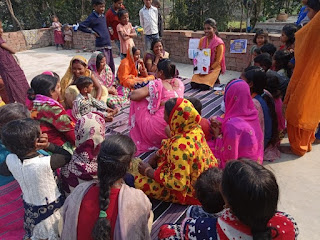शिक्षा के बारे में बापू के विचार
महात्मा गाँधी जी के अनुरूप विद्यालय, घर का ही विस्तार होना चाहिए। यदि सर्वोत्तम परिणाम प्राप्त करना है, तो एक बच्चा घर और विद्यालय में जो संस्कार सीखता है, उनके बीच सामंजस्य होना चाहिए। एक नयी भाषा के माध्यम से शिक्षा उस सामंजस्य को तोड़ देती है जो एक बच्चे के लिए उसके शुरुआती सीखने के सफर में मौजूद होने चाहिए।
जो लोग मातृभाषा के साथ इस रिश्ते को तोड़ते हैं, वे लोगों के दुश्मन होते हैं, भले ही उनके इरादे नेक हों। इस शिक्षा प्रणाली का स्वेच्छा से शिकार होना उतना ही अच्छा है जितना कि अपनी माताओं के प्रति अपने कर्तव्य के प्रति विश्वासघात।
विदेशी पद्धति की शिक्षा द्वारा किया गया नुकसान यहीं नहीं रुकता; यह बहुत आगे जाता है।
इसने शिक्षित वर्गों और जनता के बीच एक खाई पैदा कर दी है। लोग हमें अपने से अलग प्राणी के रूप में देखते हैं।
गाँधी जी कहते हैं कि जिस तरह से अंग्रेजी शिक्षा दी गयी है, उसने अंग्रेजी पढ़े लिखे भारतीयों को कमजोर कर दिया है, इसने भारतीय छात्रों की ऊर्जा शक्ति पर भारी दबाव डाला है और हमें नकलची बना दिया है। स्थानीय भाषाओं को विस्थापित करने की प्रक्रिया ब्रिटिश संबंध में सबसे दुखद अध्यायों में से एक रही है।
(Source: महात्मा गाँधी के चयनित कार्य, वॉल्यूम 5, सत्य की आवाज)
नई तालीम के माध्यम से बापू ने दर्शाया है कि किस तरह हम अपने बच्चों का सर्वांगीण विकास अपने गाँव समाज की बातों, क्रियाओं को सीखकर कर सकते हैं। अपने आसपास के क्षेत्र में होने वाली शारीरिक गतिविधि का सम्पूर्ण बोध तथा अपने समाज, वातावरण का महत्व बच्चों को पता हो यही गुण बापू के अनुसार किसी भी व्यक्ति को सक्षम बनाने में सही साबित होंगे।
बहुत सारे लोग आज मानते हैं कि नई तालीम एक पुरानी शिक्षा पद्धति है। गाँधी जी के विचार बीसवीं सदी तक ठीक हैं उन्होंने गांवों के विकास के बारे अनेकों बात कही है। आज के समाज मे नई तालीम कैसे लाभप्रद होगी? आज हम ऐसे परिवेश हैं, जहां अमीर और अमीर होता जा रहा है और गरीब और गरीब। इसका संतुलन बिठाना किसका काम है?
हम आज आपको इसी विचार के साथ छोड़ते है कि क्या यही शिक्षा हम अपने बच्चों को देना चाहते हैं, जो हमने प्राप्त की है या हमें गांधी जी के विचारों पर विचार करने की आवश्यकता 21वीं सदी में भी है?






